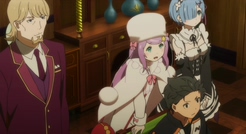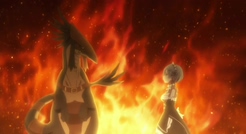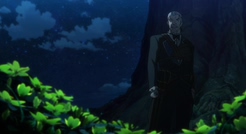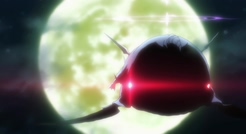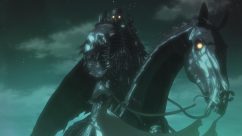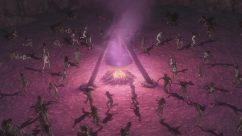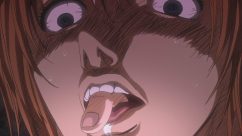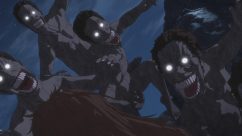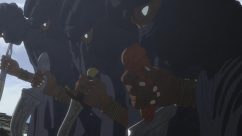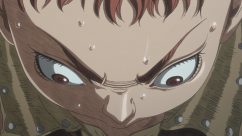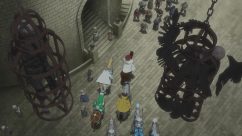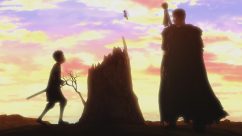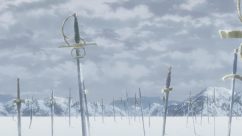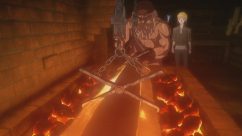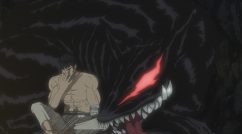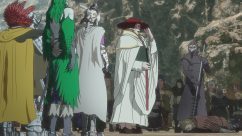I certainly am glad that we got positive Subaru back, he’s finally getting on track and using his head. Now that he is not acting like an insane madman, things are going well. Too well in fact. This is somewhat of a personal gripe but I am not too fond of just how fast things are working out. The past episodes made the crisis facing Subaru into an insurmountable task and yet with a few logical moves everyone that belittled him in previous loops is suddenly looking at him with respect. All the praise Subaru is getting almost seems like an apology to the viewer for the excessive suffering and to me it feels a little patronising as well as cheap. I think giving a few scenes with Rem and Subaru brainstorming a plan could have remedied this issue and made Subaru’s sudden wit less out of the blue. For one the anime leaves out a very important detail which left likely others as well as myself confused. Before Crusch mentioned that Subaru has no power to promise anything to her and yet here he is making deals with mining rights with both Crusch and Anastasia with no trouble. What was left out is that Rem wasn’t just at Crusch’s house to help with Subaru’s recovery but was in fact given right by Roswaal to negotiate for help as he suspected that the cultists would come to attack his manor. When Subaru asked Rem for help she gave him the right to negotiate thus allowing him to put forward mining rights as a bargaining chip.
Wilhelm got some development here as we learn he has a deep seated grudge against the white whale for killing his wife. I am wondering if some Moby Dick symbolism might come into play here and possibly lead Wilhelm to his death. It seems he’s not the only one affected as a number of knights seem grateful to Subaru for giving them an opportunity to strike back at the White Whale. You may be asking how they can have a grudge if the White Whale erases people’s existence but that is another detail unfortunately left out of the anime adaption. Apparently if the White Whale eats you then it erases your existence, however if it kills you then it just takes your name. Hence why Crusch said during her speech that the number of graves that they cannot even inscribe with names will only rise. Hence the reason why Wilhelm’s wife is only referred to as “that master swordsman” who wasn’t Reinhart as I initially thought. Rem continues to prove herself to be the best female character, and while you might think it presumptuous for me to declare that I have heard news of Rem body pillows being delayed due to overwhelming demand so perhaps that sentiment is shared by many. Still seeing her have moments with Subaru is always heartwarming though worrisome as she has essentially become the pillar of his mental health. If she falls in this battle then I see Subaru falling fast with her. Also her getting jealous over a ground dragon getting close to Subaru was quite funny. Yeah…I may be fond of this character a little too much.
The last scene with the white whale showing up was excellent as they even managed to make the silly ringtone of Subaru’s phone feel foreboding and grim. Some funny trivia about that ringtone is that apparently there was a big argument over which ringtone Subaru’s phone would have and it was resolved by the studio buying the exact model of his phone, looking through the default ringtones and recording it from the phone in the studio. The ringtone itself is the opening theme of “A Dog of Flanders” anime TV series made in 1975.(Link to opening here: https://www.youtube.com/watch?v=Y_wm4KmrDH0) Considering the ending of that anime, this could be a rather foreboding sign(The Dog of Flanders ends with the boy and his dog freezing to death in a church. Considering episode 15…) Distorting it the moment the whale came on screen was also an excellent choice in showing just how the army was reacting to the creature. I got to say that it is quite a feat to make a giant flying whale look like a genuine terrifying threat. They have built up the fight quite nicely so i think we might be in for a spectacle next episode. However the question is that if the white whale is killed, how does Subaru plan to get Crush and Anastasia to take on the witch’s cult afterwards?
~AidanAK47~

